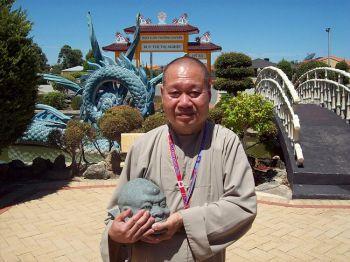
Vietnam’s Covert War Against Overseas
Buddhists
2010-01-25 | Scott Johnson | The Epoch Times
In
In 1981, they officially outlawed their country’s oldest and
original
The communists attacked the 2000-year-old tradition and created an
alternative state-controlled
Those who refused to submit allegiance to this new order were
imprisoned, tortured, and even murdered.
The current spiritual leader of the UBCV, Nobel Prize nominee the
Venerable Thich Quang Do, has spent the last 26 years under house arrest in
His struggle began years ago when as a young monk he witnessed the
execution of his Buddhist teacher by the communists.

PERSECUTED: A Buddhist monk holds a desecrated statute
at his temple in
Viewed as antagonists
to communist ideology, Do and his fellow Buddhists are a target of persecution
inside, and now outside,
Just days after monks at a Buddhist temple in
The first desecration occurred after the temple’s head monk, who
is the UBCV’s Australian representative, attended a Buddhist conference
in
The second desecration occurred after this same monk sponsored a
delegation of UBCV exiles to meet with the Australian government in Parliament
House,
Thus, the beheadings were clearly viewed as a warning to the Australian
Buddhists. For Hanoi, the ramifications of Buddhists speaking out on human
rights abuses is geopolitical, for their authoritarian regime has come under
growing international pressure to cease religious persecution.
In the
In fact,
Ever since, calls for
Today,
These covert mechanisms involve expanding so-called “legal”
churches while persecuting “illegal” churches that refuse to submit
to communist control. Religious groups across Vietnam—Buddhists,
Montagnard and Hmong Christians, Catholics, Hoa Hao, and Cai Dai sects, and
other dissidents like democracy advocates, journalists, and bloggers—all
face the same repressive measures.
Hanoi’s
Secret Policy Directives
Incredibly, evidence of
The overseas spokesman for the UBCV, Vo Van Ai even testified before
the U.S. Congress on this fact. Speaking before the House Committee on
International Relations on
The “An Quang Buddhist Church” is Hanoi’s term for
the UBCV and the secret directives, authored by the Public Security Science
Institute in Hanoi are entitled “On Religions and the Struggle Against
Activities Exploiting Religion—Internal Document for Study and
Circulation in the People’s Security Services.”
|
|
|
STANDING STRONG: Penelope
Faulkner, spokesperson for Paris-based International Buddhist Information
Bureau, speaks out against |
Penelope Faulkner, a long time activist with the International Buddhist
Information Bureau, reports the secret directive instructs party cadres and
security agents at every level to “oppose, repress, isolate, and
divide” UBCV leaders. She states, “These directives order the
training of special agents to infiltrate the UBCV, not only to gather
intelligence and report on UBCV activities, but to create schisms and dissent
within their ranks, thus undermining the UBCV from within.”
According to Faulkner these “special agents” have extended
these activities overseas with
Faulkner states that
The main one now attacking the UBCV was formed at a conference in
Faulkner said the ploy of these fronts “is not to overtly promote
communism, but to tell Buddhists they should not get mixed up in politics, just
stick to praying and sending money to
Faulkner has no doubt that Hanoi is involved in intimidating overseas
Buddhists and she quotes from the secret directive which orders Vietnamese
authorities to “take pre-emptive action to prevent Western countries from
making human rights investigations” in Vietnam.
The directive states, “We urge the Politburo to coordinate
activities between the Vietnamese Communist Party’s departments of
propaganda and mobilization, interior affairs, foreign affairs, religious
affairs, and overseas Vietnamese to work together on this policy.”
One member of this “Transcontinental UBCV,” a Vietnamese
monk based in
A few days later the UBCV temple in
Faulkner was among the UBCV delegation, and while she admits these security
officers were likely attending the Australian Parliament for some diplomatic
matter, she has no doubt they notified their bosses in Hanoi of seeing them at
Parliament House.
She is also sure the desecration of the temple in
In January 2010 this reporter traveled to the
Nhon also said he received an anonymous envelope of gold and silver
“funeral paper” in the mail in 2009. The paper is an ancient
funeral tradition, and he said there was only one explanation for this letter:
“a death threat.”
Members of his church in Sydney and Melbourne have also received
threats over the telephone, he said.
Nhon said the statute would be repaired.
Scott Johnson is a lawyer,
writer and human rights activist who has focused on issues in
Courtesy: http://www.theepochtimes.com/n2/content/view/28633